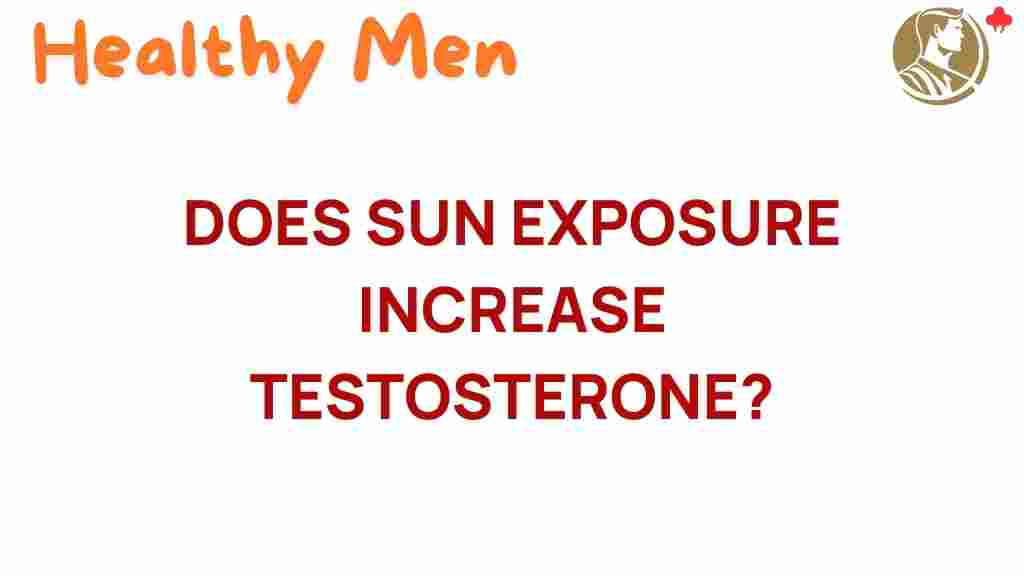Does Sun Exposure Really Boost Testosterone Levels?
In recent years, there has been a growing interest in the relationship between sun exposure and testosterone levels. Many health enthusiasts and fitness experts believe that soaking up the sun can lead to a natural boost in testosterone, contributing to better health benefits and enhanced wellness. But how much truth is there to this claim? In this article, we will uncover the truth about sun exposure, its effect on testosterone production, and how it can influence your overall fitness and hormonal balance.
The Science Behind Sun Exposure and Testosterone
Sun exposure is known to trigger the synthesis of vitamin D in our skin. Vitamin D plays a crucial role in numerous bodily functions, including the regulation of hormones. Research has shown a notable connection between vitamin D levels and testosterone production. Studies indicate that men with higher levels of vitamin D also tend to have higher testosterone levels. But how does this process work?
- UVB Radiation: When UVB rays from the sun hit the skin, they stimulate the production of vitamin D.
- Vitamin D and Hormonal Balance: Vitamin D receptors are present in the testes, where testosterone is produced, suggesting that adequate vitamin D levels may enhance testosterone synthesis.
- Seasonal Variations: Research has shown that testosterone levels in men tend to peak in summer months when sun exposure is highest and dip in winter months.
Health Benefits of Sun Exposure
Beyond boosting testosterone levels, sun exposure offers a wide array of health benefits:
- Improved Mood: Exposure to sunlight increases the production of serotonin, a hormone that enhances mood and promotes a sense of well-being.
- Stronger Bones: Vitamin D is essential for calcium absorption, contributing to stronger bones and reducing the risk of osteoporosis.
- Enhanced Immune Function: Adequate vitamin D levels may help bolster the immune system, reducing the risk of infections.
- Better Sleep: Sun exposure helps regulate melatonin production, leading to improved sleep quality.
How to Safely Increase Sun Exposure
To reap the benefits of sun exposure while minimizing the risk of skin damage, follow these steps:
- Choose the Right Time: Aim for mid-morning to late afternoon when the sun’s UVB rays are most potent.
- Limit Exposure: Start with short periods (10-30 minutes) depending on your skin type and gradually increase.
- Protect Your Skin: Use sunscreen with adequate SPF after initial sun exposure to prevent burns.
- Stay Hydrated: Drink plenty of water to avoid dehydration during sun exposure.
Internal Factors Influencing Testosterone Levels
While sun exposure can contribute to higher testosterone levels, several internal factors also play a significant role:
- Age: Testosterone levels naturally decline with age.
- Body Composition: Higher body fat percentages can lead to lower testosterone levels.
- Diet: A balanced diet rich in healthy fats, proteins, and vitamins is essential for hormonal balance.
- Exercise: Regular physical activity, especially strength training, can naturally boost testosterone levels.
Natural Remedies to Boost Testosterone
In addition to sun exposure, several natural remedies can help enhance testosterone levels:
- Zinc Supplements: Zinc is crucial for testosterone production. Foods rich in zinc include oysters, beef, and pumpkin seeds.
- Healthy Fats: Incorporating sources of healthy fats, such as avocados, nuts, and olive oil, can support testosterone production.
- Herbs: Certain herbs like fenugreek and ashwagandha have been linked to increased testosterone levels.
Troubleshooting Tips for Low Testosterone
If you suspect low testosterone levels, consider the following troubleshooting tips:
- Consult a Healthcare Provider: Blood tests can accurately measure testosterone levels and assess any underlying issues.
- Review Medications: Some medications can adversely affect testosterone levels; discuss alternatives with your doctor.
- Evaluate Lifestyle: Assess your exercise routine, diet, and stress levels, as these factors can influence hormonal balance.
Conclusion: Embrace Sun Exposure for Health and Wellness
In conclusion, sun exposure does have a positive effect on testosterone levels, primarily through the production of vitamin D. Alongside this, the myriad of health benefits associated with sun exposure, such as improved mood and enhanced immune function, highlights its importance in our daily lives. By practicing safe sun exposure and incorporating other lifestyle changes, you can effectively promote a healthy hormonal balance and support your overall fitness and wellness.
For more information on natural remedies and health tips, check out our wellness resources. Additionally, for studies on the effects of vitamin D on testosterone, visit this research article.
This article is in the category Fitness and created by healthymen Team
